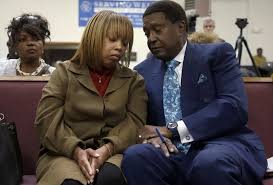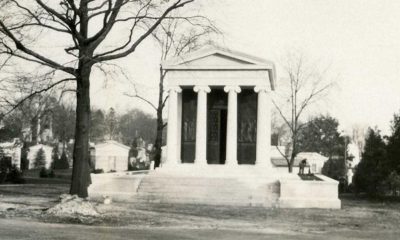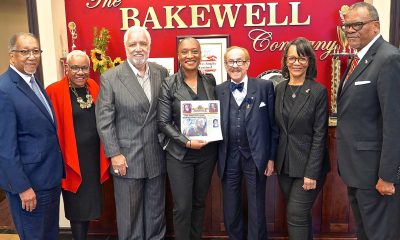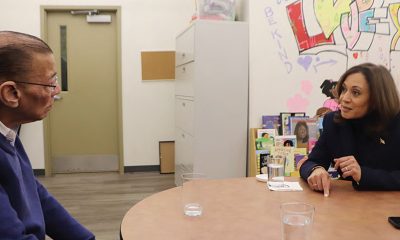Business
#DontMuteDC Movement Coalesces Around Famous MetroPCS Store
WASHINGTON INFORMERS — For nearly a quarter-century, the MetroPCS store on the corner of Florida Avenue and 7th Street in Northwest kept residents and passersby alike jamming to the sounds of go-go, over time solidifying its status as a staple of authentic, homegrown culture, especially as gentrification displaced countless residents and businesses in the Shaw area.
By Sam P. K. Collins
For nearly a quarter-century, the MetroPCS store on the corner of Florida Avenue and 7th Street in Northwest kept residents and passersby alike jamming to the sounds of go-go, over time solidifying its status as a staple of authentic, homegrown culture, especially as gentrification displaced countless residents and businesses in the Shaw area.
That may no longer be the case, however, as T-Mobile’s corporate office recently told the local MetroPCS branch to cut off the music, allegedly in response to complaints from residents in nearby condos about the volume.
Upon hearing this news Monday, local activists, go-go aficionados and others rallied against what they considered the latest assault on their way of life.
“When I left school, I would fall asleep in my mother’s car and get woken up by the music at MetroPCS,” said Tyrell Brunson, a local producer and alumnus of the now-shuttered Gage-Eckington Elementary School.
Brunson counted among the more than 50 participants at a protest in the parking lot of the CVS Pharmacy across the street from MetroPCS on Monday evening.
Brunson, who said Backyard Band influenced his sound, said a Twitter post by award-winning producer Tone P spurred him into action Monday. He and several friends gathered in the parking lot and listened as Tone P, Kymone Freeman of We Act Radio, DJ D-Money, Swamp Guinee, Dusty of Tru Expressionz and countless other musicians and activists spoke on the microphone about the MetroPCS’ impact on their lives.
“I went to go-gos from the age of 14 until the city tried to eliminate it,” Brunson, 28, said. “This is a bigger issue than the music. They’re shutting down our culture. A lot of people are here. I understood the strength in numbers, and this won’t be the end of it.”
Donald Campbell, who owns the MetroPCS branch under Central Communications, reportedly received threats of a lawsuit from nearby residents about the music blasting from the store’s speakers. The orders from T-Mobile’s corporate office followed Campbell’s several successful appeals to the D.C. government to maintain the status quo.

#DontMuteDC creators and Howard University students Julien Broom eld and Asia Grant make their voices heard at the intersection of 7th Street and Florida Avenue in northwest D.C. (Photo by: Ja’Mon Jackson/WI Bridge)
On Monday, he politely denied a request for an interview, asking that The Informer instead email him a list of questions to be answered later.
By Tuesday morning, more than 29,000 people have signed an online petition circulated under the auspices of the #DontMuteDC movement.
Later that day, the Take Ova Band, also known as TOB, had been scheduled to perform in front of the Frank D. Reeves Municipal Center in Northwest in a show of solidarity with the go-go community. Campbell hosted a press conference Wednesday morning, and Check-It Enterprises and We Act Radio scheduled a town hall discussion for the following day.
D.C. Councilmember Brianne Nadeau (D-Ward 1) also entered the fray, sending a letter Monday to Kathleen Ham, T-Mobile USA’s senior vice president of government affairs, asking that the corporation reverse its order and honor the DC Department of Consumer and Regulatory Affairs’ determination that no noise violations had occurred.
Later that evening, Nadeau and fellow Councilman Robert White (D-At large), a fifth-generation Washingtonian, spoke words of support to their constituents.
“Go-go is something that we need to hang on to as MetroPCS keeps that alive,” Nadeau said. “I live just up Georgia Avenue and see people getting some music and jamming out. Ward 1 is vibrant and diverse and we love music.
“It’s not the government that shut this down,” she said. “Now we just have to figure out how to restore music in the corridor. We have to do more work in our communities and help people appreciate what we have.”
Since 1995, Campbell’s MetroPCS store has garnered a reputation as one of the largest retailer of cellphones in the D.C. area and a provider of go-go music. At one point, Campbell opened four locations, including one on 4th and R streets in Northeast next to a barbershop owned by the late Polo of go-go band TCB.
For Dusty, founder and frontman of the Tru Expressionz Band, 7th Street and Florida Avenue has a different level of significance for him as an entrepreneur and go-go fan. He reflected on what the current battle meant for go-go bands and the industry at large.
“The spot [across the street from the MetroPCS store] used to be the late-night spot with the photo booths,” Dusty said moments before addressing the demonstrators at Monday’s protest.
In recent years, Tru Expressionz, which Dusty started as a teenager, has kept bands grooving at Peace Lounge near Howard University and Fire Station 1 Restaurant & Bar in Silver Spring, Maryland.
“Even though you got new folks coming in, you got people who live and are from here,” Dusty said. “It’s about the store, but in general, this is one of the only sections of the city where we got street music. We can’t let that go.
“We just got to continue doing go-go shows on a bigger platform and push the music in a different way,” he said. “You got cover bands in different areas making money. So even if your band is doing radio covers or making original music, we can still push our genre. We can’t limit our music when we are so powerful.”
This is article originally appeared in the Washington Informer.
Business
G.O.P. Lawmakers: Repeal AB 5 and Resist Nationalization of “Disastrous” Contractor Law
Republican lawmakers gathered outside of the Employee Development Department in Sacramento on Jan. 23 to call for the repeal of AB5, the five-year old California law that reclassified gig workers and other independent contractors as W-2 employees under the state’s labor code.

By California Black Media
Republican lawmakers gathered outside of the Employee Development Department in Sacramento on Jan. 23 to call for the repeal of AB5, the five-year old California law that reclassified gig workers and other independent contractors as W-2 employees under the state’s labor code.
Organizers said they also held the rally to push back against current efforts in Washington to pass a similar federal law.
“We are here to talk about this very important issue – a battle we have fought for many years – to stop this disastrous AB 5 policy,” said Assembly Republican Leader James Gallagher (R-Yuba City).
Now, that threat has gone national as we have seen this new rule being pushed out of the Biden administration,” Gallagher continued.
On Jan. 10, the U.S. Department of Labor issued a new rule providing guidance on “on how to analyze who is an employee or independent contractor under the Fair Labor Standards Act (FLSA).”
“This final rule rescinds the Independent Contractor Status Under the Fair Labor Standards Act rule (2021 IC Rule), that was published on January 7, 2021, and replaces it with an analysis for determining employee or independent contractor status that is more consistent with the FLSA as interpreted by longstanding judicial precedent,” a Department of Labor statement reads.
U.S. Congressmember Kevin Kiley (R-CA-3), who is a former California Assemblymember, spoke at the rally.
“We are here today to warn against the nationalization of one of the worst laws that has ever been passed in California, which has devastated the livelihoods of folks in over 600 professions,” said Kiley, adding that the law has led to a 10.5% decline in self-employment in California.
Kiley blamed U.S Acting Secretary of Labor, July Su, who was the former secretary of the California Labor and Workforce Development Agency, for leading the effort to redefine “contract workers” at the federal level.
Kiley said two separate lawsuits have been filed against Su’s Rule – its constitutionality and the way it was enacted, respectively. He said he is also working on legislation in Congress that puts restrictions on the creation and implementation of executive branch decisions like Su’s.
Assemblymember Kate Sanchez (R-Rancho Santa Margarita) announced that she plans to introduce legislation to repeal AB 5 during the current legislative session.
“So many working moms like myself, who are also raising kids, managing households, were devastated by the effects of AB 5 because they lost access to hundreds of flexible professions,” Sanchez continued. “I’ve been told by many of these women that they have lost their livelihoods as bookkeepers, artists, family caregivers, designers, and hairstylists because of this destructive law.”
Activism
Oakland Post: Week of April 10 – 16, 2024
The printed Weekly Edition of the Oakland Post: Week of April 10 – 16, 2024

To enlarge your view of this issue, use the slider, magnifying glass icon or full page icon in the lower right corner of the browser window. ![]()
Activism
Oakland Post: Week of April 3 – 6, 2024
The printed Weekly Edition of the Oakland Post: Week of April 3 – 6, 2024
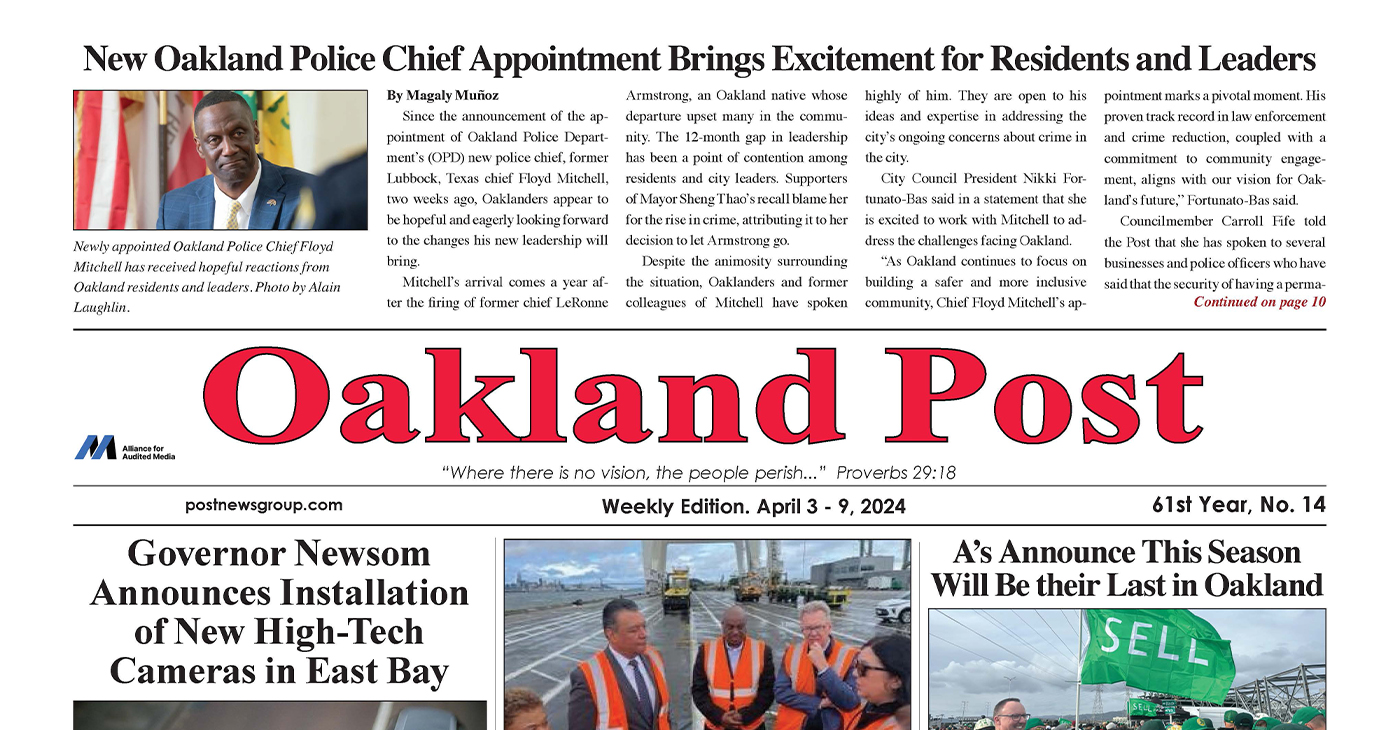
To enlarge your view of this issue, use the slider, magnifying glass icon or full page icon in the lower right corner of the browser window. ![]()
-

 Activism4 weeks ago
Activism4 weeks agoOakland Post: Week of March 20 – 26, 2024
-

 #NNPA BlackPress3 weeks ago
#NNPA BlackPress3 weeks agoMayor, City Council President React to May 31 Closing of Birmingham-Southern College
-

 #NNPA BlackPress3 weeks ago
#NNPA BlackPress3 weeks agoFrom Raids to Revelations: The Dark Turn in Sean ‘Diddy’ Combs’ Saga
-

 #NNPA BlackPress3 weeks ago
#NNPA BlackPress3 weeks agoCOMMENTARY: D.C. Crime Bill Fails to Address Root Causes of Violence and Incarceration
-

 #NNPA BlackPress3 weeks ago
#NNPA BlackPress3 weeks agoCOMMENTARY: Lady Day and The Lights!
-

 #NNPA BlackPress3 weeks ago
#NNPA BlackPress3 weeks agoBaltimore Key Bridge Catastrophe: A City’s Heartbreak and a Nation’s Alarm
-

 #NNPA BlackPress3 weeks ago
#NNPA BlackPress3 weeks agoBaltimore’s Key Bridge Struck by Ship, Collapses into Water
-

 Activism3 weeks ago
Activism3 weeks agoOakland Post: Week of March 27 – April 2, 2024

